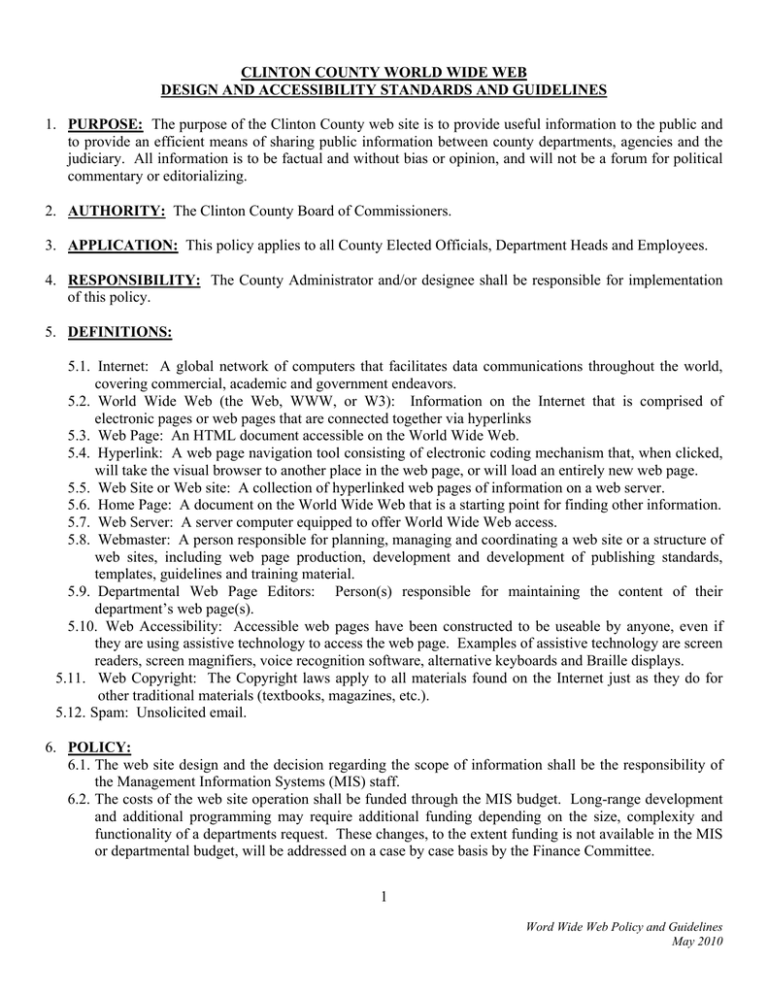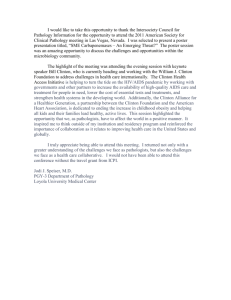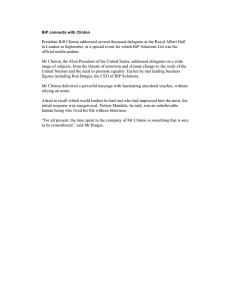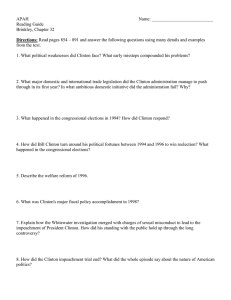World Wide Web Policy
advertisement

CLINTON COUNTY WORLD WIDE WEB DESIGN AND ACCESSIBILITY STANDARDS AND GUIDELINES 1. PURPOSE: The purpose of the Clinton County web site is to provide useful information to the public and to provide an efficient means of sharing public information between county departments, agencies and the judiciary. All information is to be factual and without bias or opinion, and will not be a forum for political commentary or editorializing. 2. AUTHORITY: The Clinton County Board of Commissioners. 3. APPLICATION: This policy applies to all County Elected Officials, Department Heads and Employees. 4. RESPONSIBILITY: The County Administrator and/or designee shall be responsible for implementation of this policy. 5. DEFINITIONS: 5.1. Internet: A global network of computers that facilitates data communications throughout the world, covering commercial, academic and government endeavors. 5.2. World Wide Web (the Web, WWW, or W3): Information on the Internet that is comprised of electronic pages or web pages that are connected together via hyperlinks 5.3. Web Page: An HTML document accessible on the World Wide Web. 5.4. Hyperlink: A web page navigation tool consisting of electronic coding mechanism that, when clicked, will take the visual browser to another place in the web page, or will load an entirely new web page. 5.5. Web Site or Web site: A collection of hyperlinked web pages of information on a web server. 5.6. Home Page: A document on the World Wide Web that is a starting point for finding other information. 5.7. Web Server: A server computer equipped to offer World Wide Web access. 5.8. Webmaster: A person responsible for planning, managing and coordinating a web site or a structure of web sites, including web page production, development and development of publishing standards, templates, guidelines and training material. 5.9. Departmental Web Page Editors: Person(s) responsible for maintaining the content of their department’s web page(s). 5.10. Web Accessibility: Accessible web pages have been constructed to be useable by anyone, even if they are using assistive technology to access the web page. Examples of assistive technology are screen readers, screen magnifiers, voice recognition software, alternative keyboards and Braille displays. 5.11. Web Copyright: The Copyright laws apply to all materials found on the Internet just as they do for other traditional materials (textbooks, magazines, etc.). 5.12. Spam: Unsolicited email. 6. POLICY: 6.1. The web site design and the decision regarding the scope of information shall be the responsibility of the Management Information Systems (MIS) staff. 6.2. The costs of the web site operation shall be funded through the MIS budget. Long-range development and additional programming may require additional funding depending on the size, complexity and functionality of a departments request. These changes, to the extent funding is not available in the MIS or departmental budget, will be addressed on a case by case basis by the Finance Committee. 1 Word Wide Web Policy and Guidelines May 2010 6.3. All web pages shall bear the County logo, and meet a standard design criteria including minimizing the use of colors to remain compatible with the web site design. The use of moving graphics or content is discouraged. 6.4. The name “Clinton County, Michigan”, the County seal and any other graphic identity are copyright protected and the official property of Clinton County and are not to be used on any web site without the written authorization of Clinton County, Michigan. 6.5. The Clinton County, Michigan web site is subject to the Web Accessibility Initiative (WAI) best practice guidelines and policies. (http://www.w3.org/WAI/). All images will include alternative text descriptions to facilitate the use of screen readers for those with visual disabilities. 6.6. MIS along with Administration shall train and work with representatives of each department for the content clarity, scope and functionality of individual department pages. All pages will be created in draft form to be reviewed by MIS or Administration prior to publishing to the live web site. 6.7. Each department should take active participation in the development of its web site information and encourage staff to incorporate maintenance of the web site information into their daily routines. It is also their responsibility to make sure information provided on the web site is not outdated and that all internal and external links function correctly. Web pages or files (Word documents or PDF’s) that are no longer used should be removed. 6.8. Direct hyperlinks to sites which have a legitimate government purpose or are directly related to Clinton County government services, programs and information may be included on Clinton County web pages. Hyperlinks to non-profit agencies which provide services for Clinton County residents may also be included. The web site shall not include hyperlinks to sites devoted to commercial sales or those which advocate a particular point of view. 6.9. The MIS department and/or Administration shall determine case by case whether department web pages would benefit from the use of the Newsletter or Calendar module and will work with the department on the implementation. 6.10. Clinton County has a no spam tolerance policy. Departments may choose to publish online periodicals and maintain mailing lists for notifications. Citizens may choose to sign up for specific newsletters, alerts, bulletins, etc. The means to unsubscribe from these periodicals will also be provided and will be honored immediately upon the receipt of the request to unsubscribe. Publications may only be sent to citizens who have made specific requests for such information. Departments may not sell, loan, lease, give away or share in any manner an email address or other personally identifiable information that is provided by a citizen unless required to do so by law. 6.11. The Board of Commissioners or County Administrator may suspend regular operations of the web site to provide special assistance or information to web site viewers about an emergency situation or other exceptional event. 7. ADMINISTRATIVE PROCEDURES: The County Administrator is authorized to adjust policy where necessary. 8. ADMINISTRATOR/LEGAL COUNSEL REVIEW: The Administrator has determined that this policy as submitted to the Board of Commissioners contains the necessary substance in order to carry out the purpose of the policy. The County Civil Counsel has determined that this policy as submitted contains content that appears to be legal activities of the Clinton County Board of Commissioners. 2 Word Wide Web Policy and Guidelines May 2010



